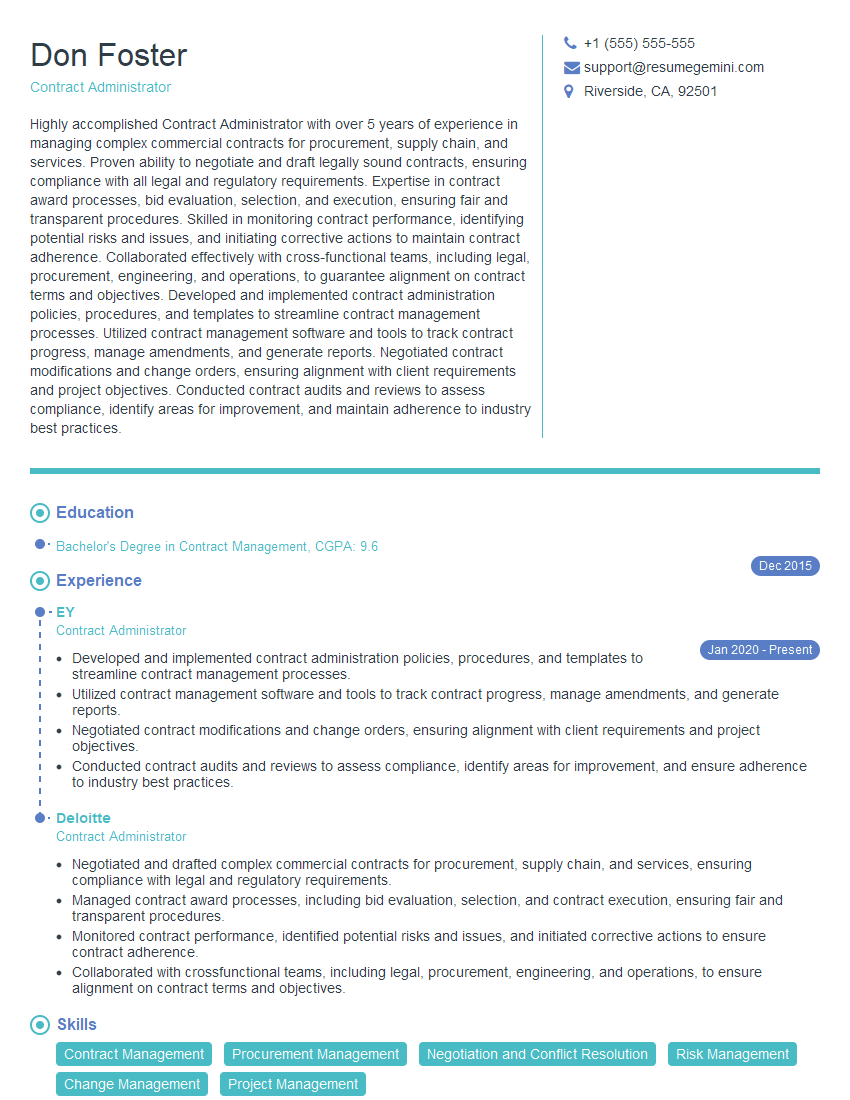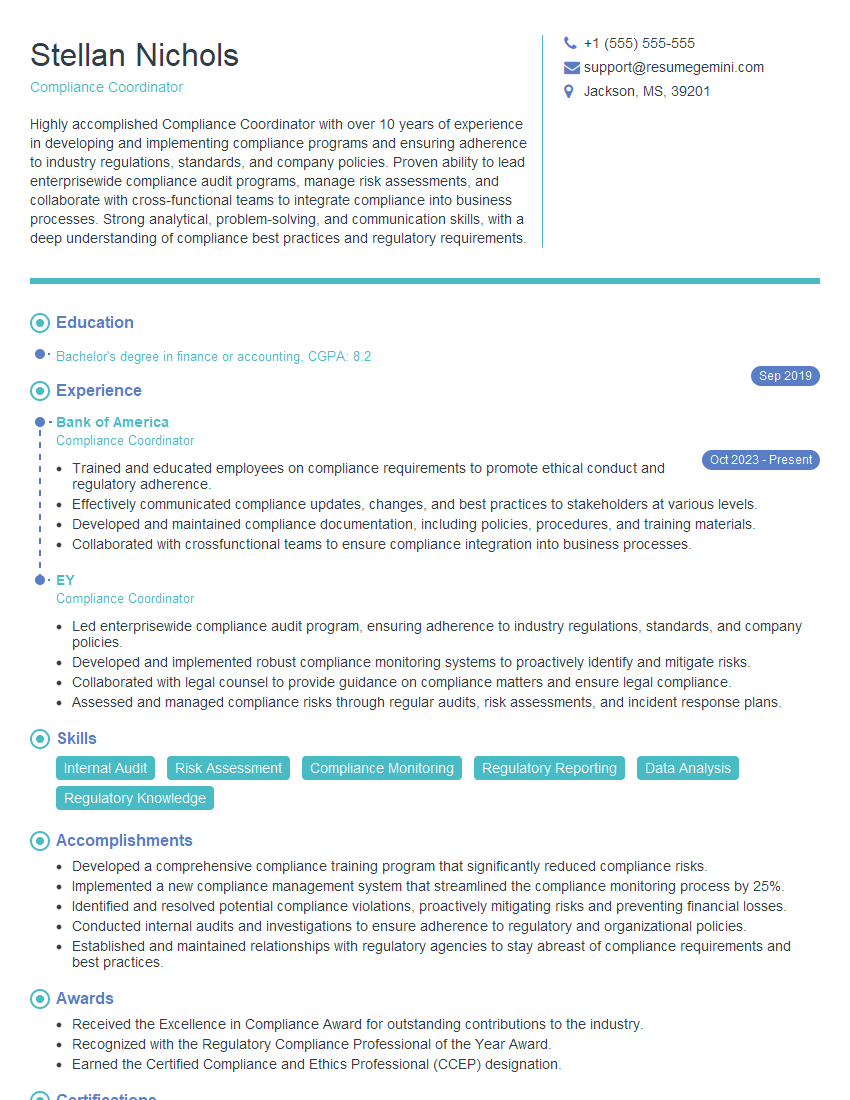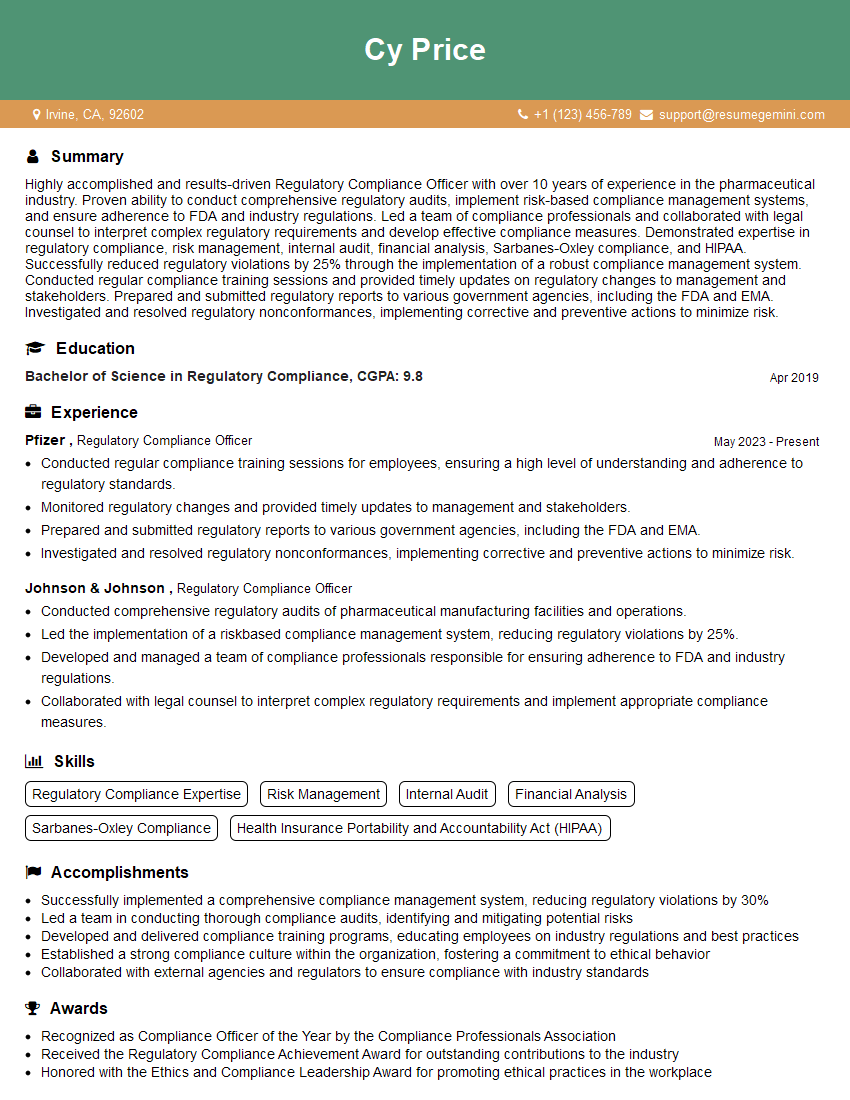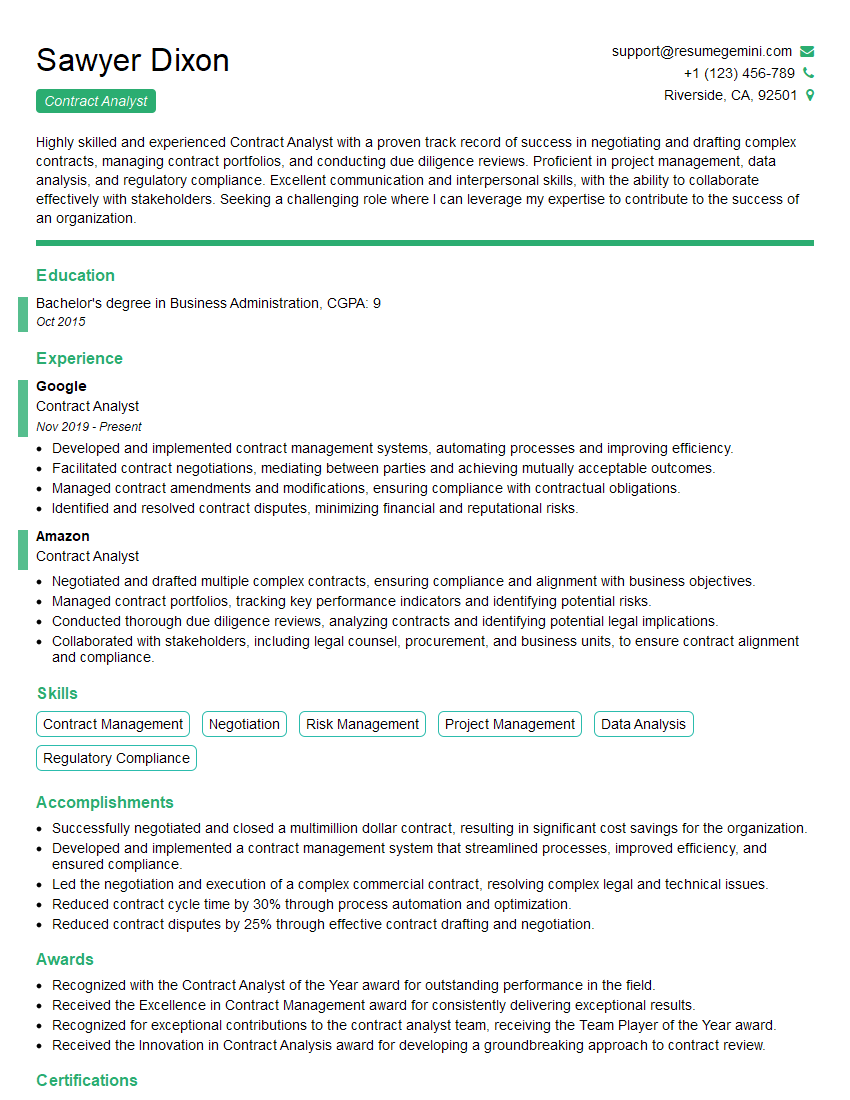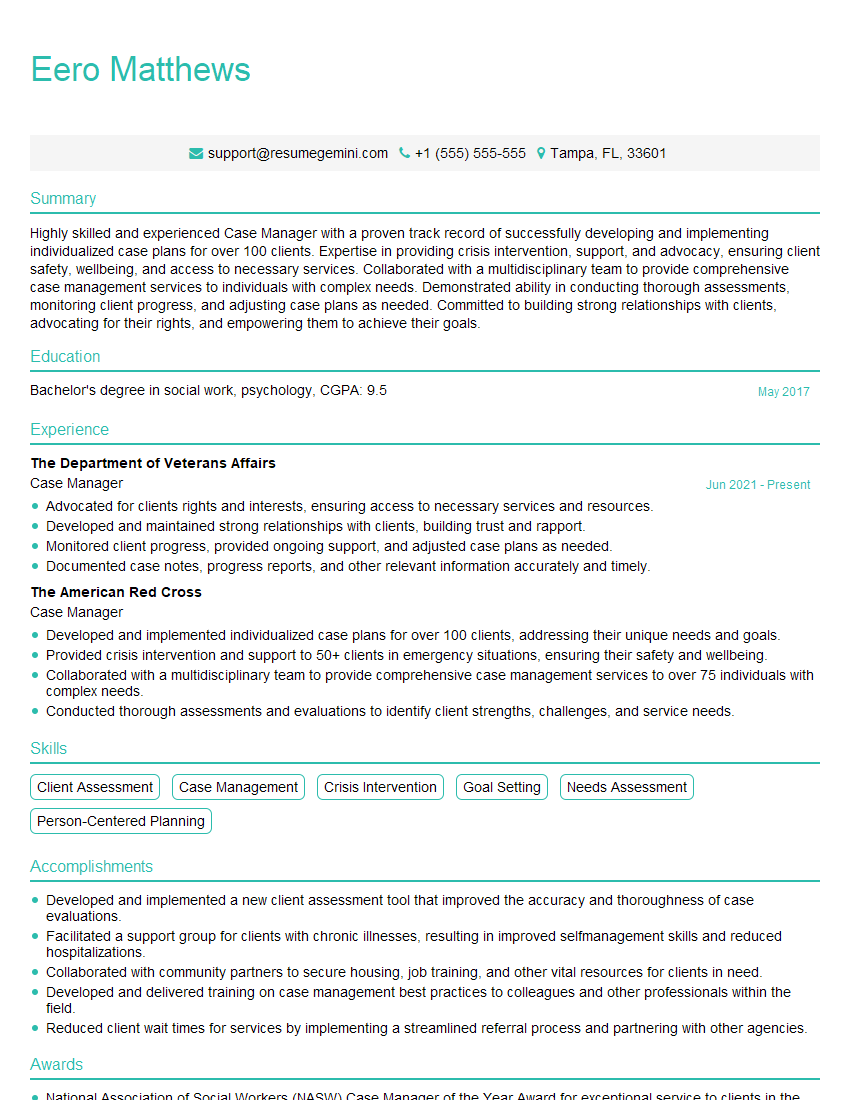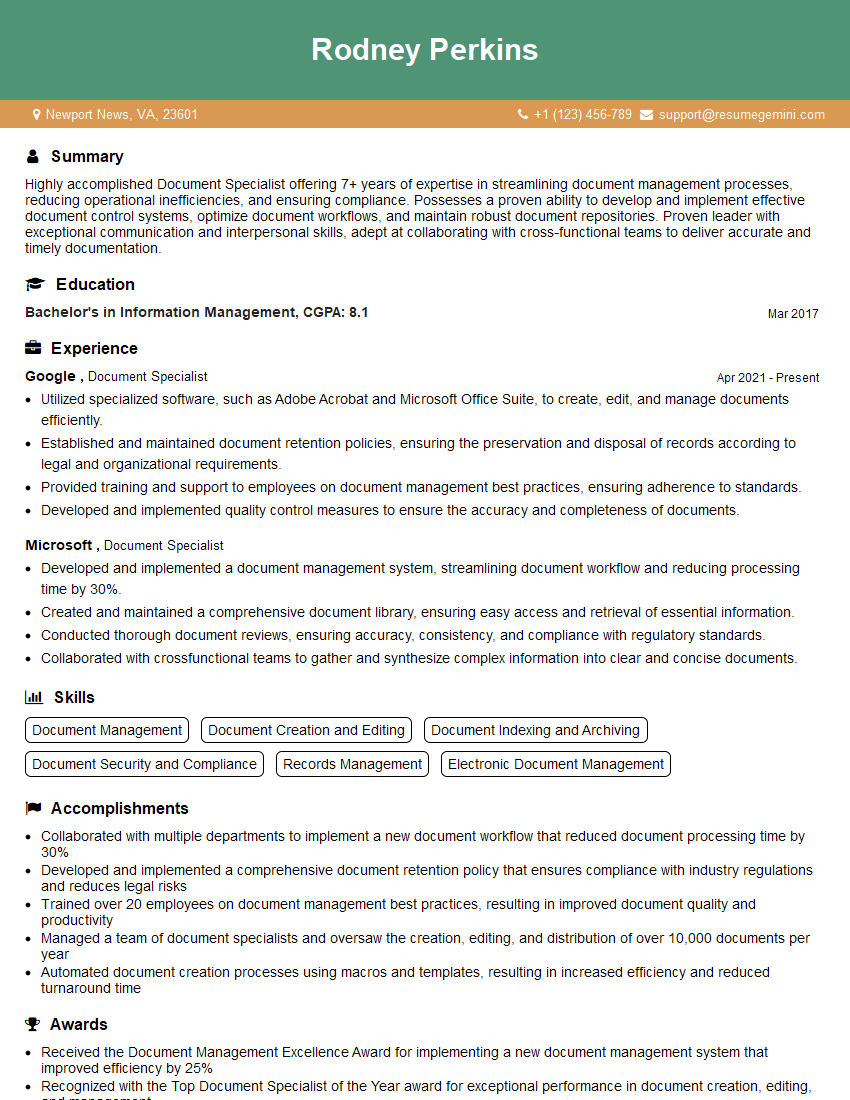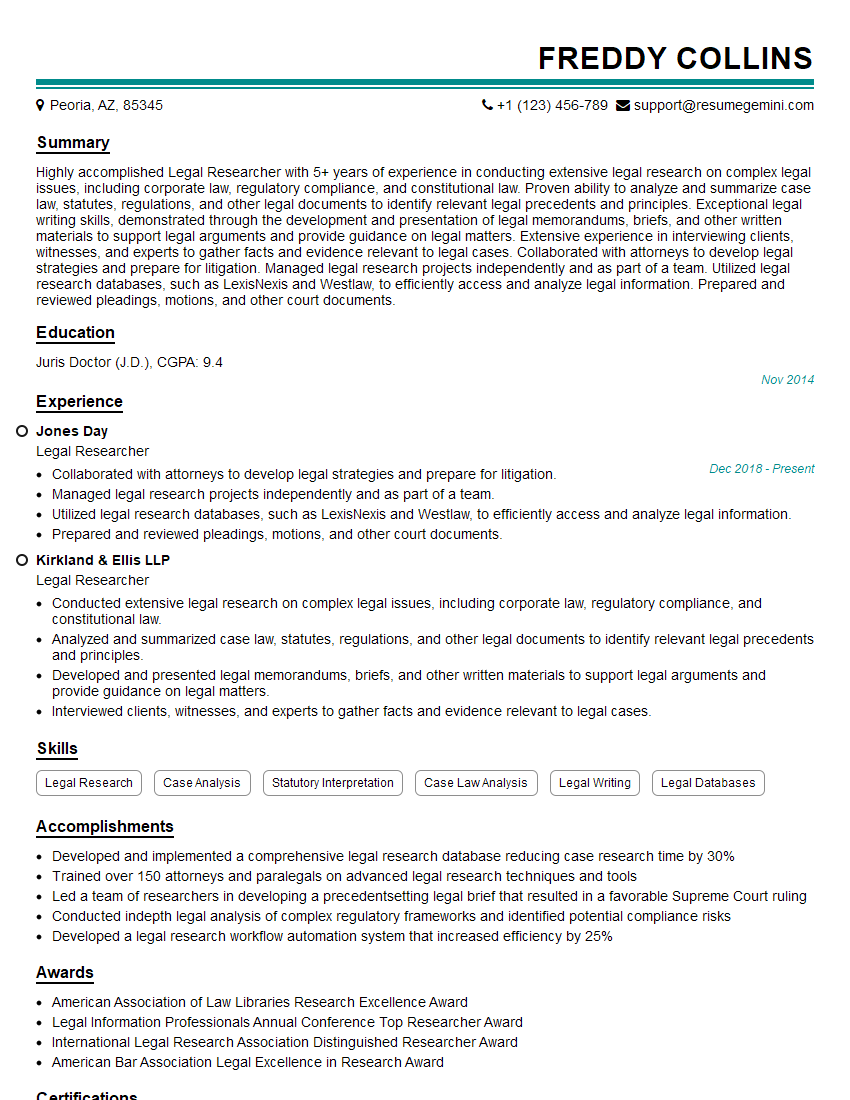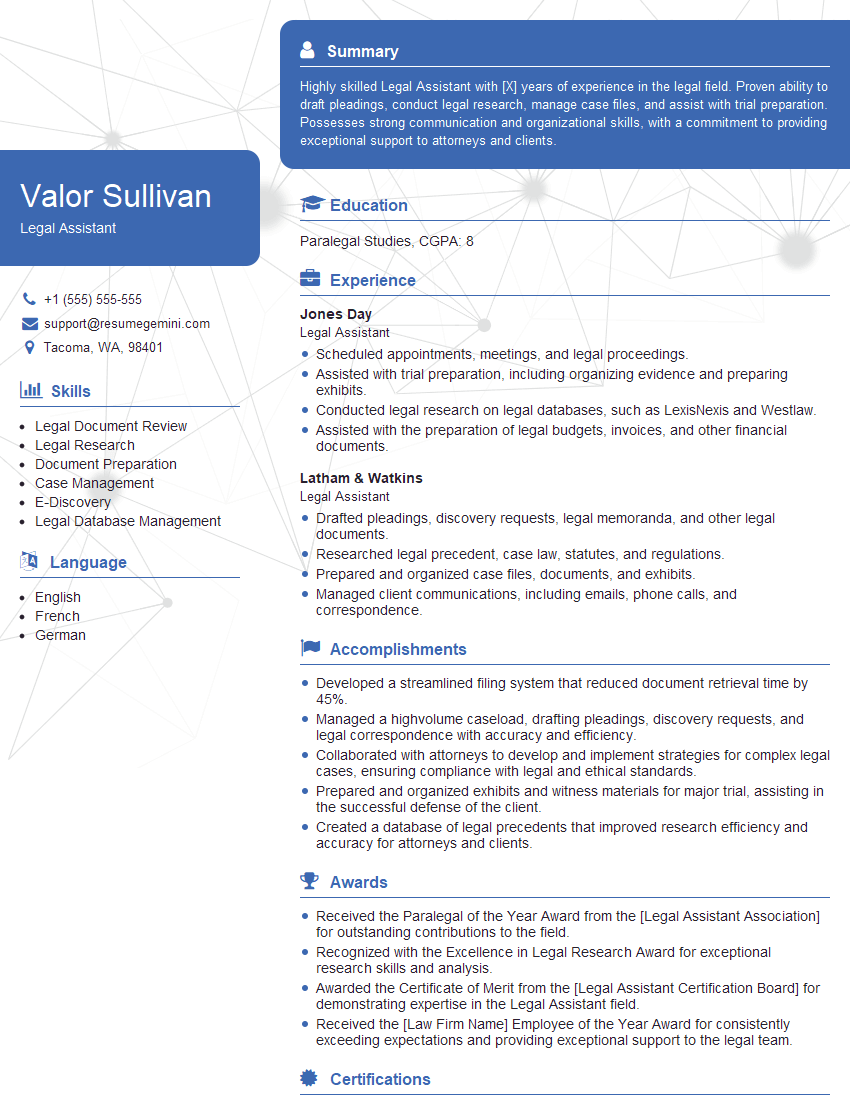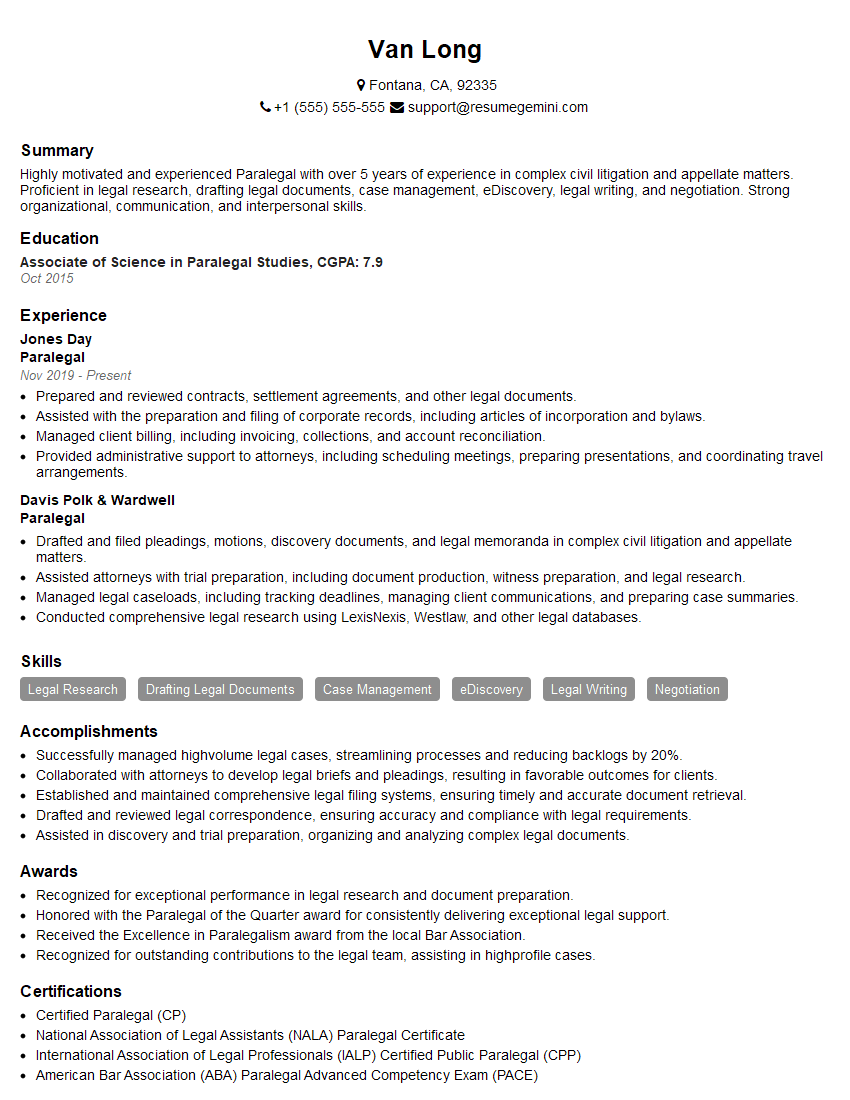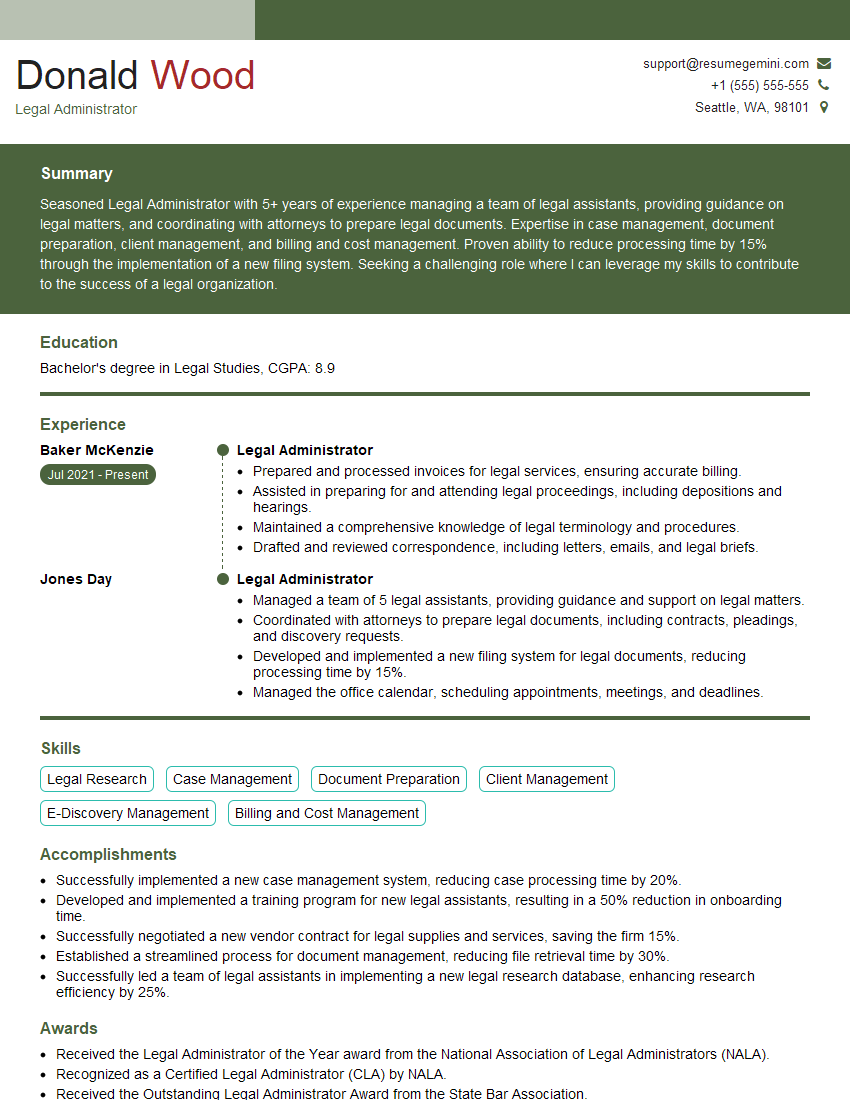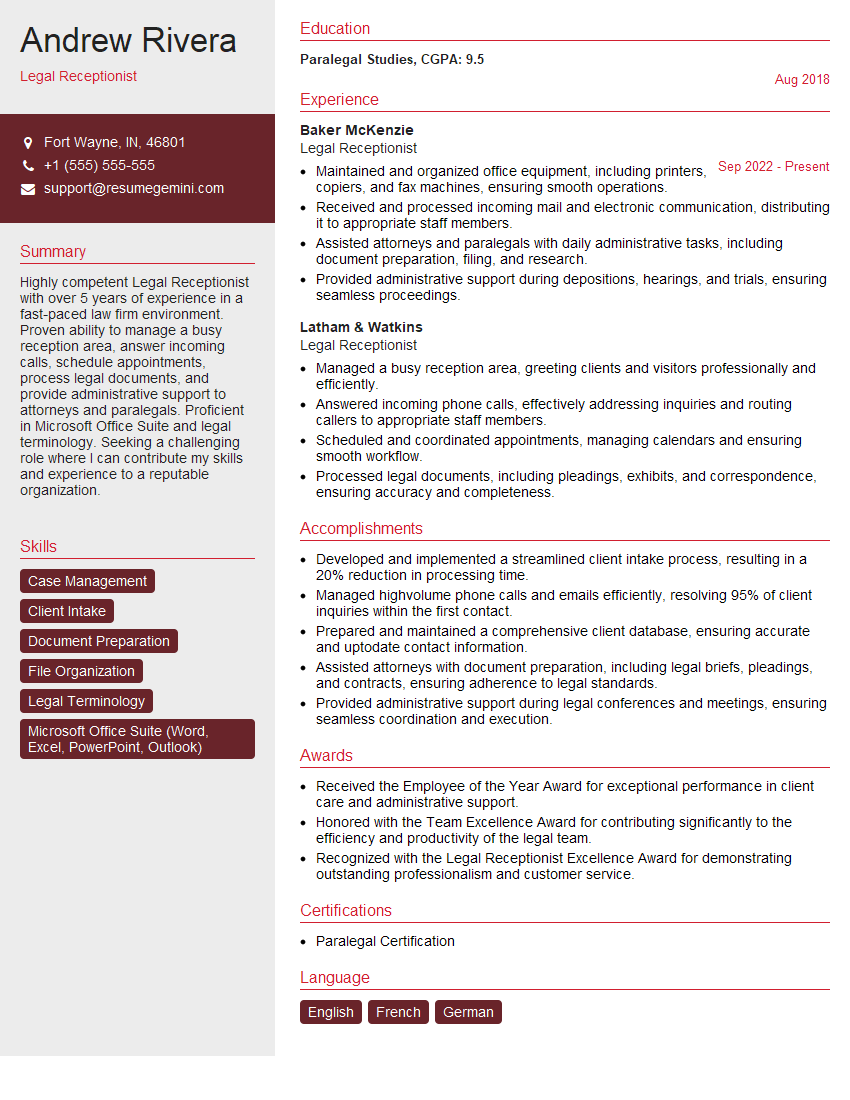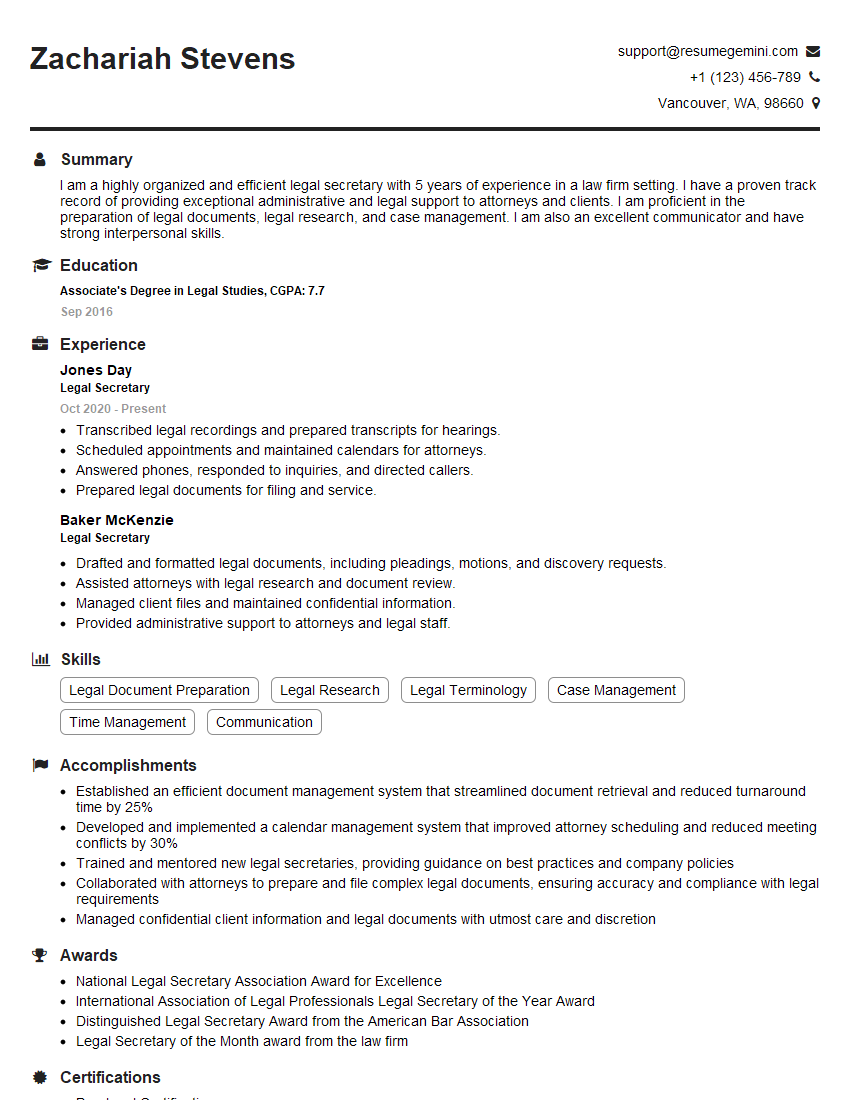Feeling uncertain about what to expect in your upcoming interview? We’ve got you covered! This blog highlights the most important Providing Assistance to Legal Professionals interview questions and provides actionable advice to help you stand out as the ideal candidate. Let’s pave the way for your success.
Questions Asked in Providing Assistance to Legal Professionals Interview
Q 1. Describe your experience with legal document preparation and management.
My experience in legal document preparation and management spans several years and encompasses a wide range of tasks. I’m proficient in drafting, reviewing, and editing various legal documents, including contracts, pleadings, motions, discovery requests, and briefs. I understand the importance of accuracy, clarity, and adherence to legal formatting standards. This includes organizing documents using robust filing systems, both physical and electronic, ensuring efficient retrieval and version control. For instance, I’ve managed complex litigation document sets involving thousands of pages, utilizing technology such as cloud-based document management systems to maintain organization and streamline workflows. This ensured quick access to the necessary documents during critical stages of litigation, significantly benefiting the legal teams involved. I am also skilled in redlining and comparing different versions of documents, which is crucial for tracking changes and ensuring accuracy.
- Drafting and Editing: I have created numerous legal documents from scratch, incorporating the necessary legal language and clauses while ensuring clarity and precision.
- Organization and Filing: I’ve implemented and maintained comprehensive filing systems, both physical and digital, ensuring efficient document retrieval and minimizing the risk of losing critical information.
- Version Control: I proficiently use version control systems to track changes and maintain a clear audit trail of document modifications.
Q 2. How familiar are you with different legal citation styles (e.g., Bluebook, ALWD)?
I am highly familiar with several legal citation styles, including the Bluebook, ALWD, and various state-specific citation guides. My understanding extends beyond simply knowing the rules; I can practically apply them to different types of legal documents and accurately cite cases, statutes, regulations, and other legal authorities. I understand the nuances of each style, such as the differences in formatting for case names, pincites, and statutory citations. The Bluebook, for example, is known for its detailed rules and its use in federal courts and many law reviews, while ALWD is a more streamlined style often preferred in state courts and some law schools. I’ve consistently used these citation styles in my work, ensuring compliance and creating well-formatted documents suitable for various courts and legal settings. I approach each citation with diligence and double-check my work to maintain consistency and accuracy. Inconsistencies in citations can lead to dismissal of arguments or cases, hence my attention to detail is paramount.
Q 3. Explain your proficiency in legal research using online databases (e.g., Westlaw, LexisNexis).
I possess extensive experience conducting legal research using online databases like Westlaw and LexisNexis. My skills encompass developing effective search strategies using keywords, connectors, and Boolean operators to efficiently retrieve relevant case law, statutes, regulations, and secondary sources. I am also adept at using advanced search techniques to refine search results and identify relevant authorities. For instance, I’ve used advanced search features to find cases involving specific jurisdictions, dates, or legal issues, saving time and improving the efficiency of legal research. I understand the importance of properly analyzing the retrieved material and ensuring that only the most relevant and up-to-date information is used. Beyond simply finding information, I focus on evaluating the authority and persuasive value of different legal sources. This critical thinking allows me to provide clients with the most accurate and effective legal advice. A recent example involved locating a narrow, yet crucial, precedent related to a specialized area of intellectual property law using highly specific search terms across multiple databases.
Q 4. What software programs are you proficient in (e.g., Microsoft Office Suite, case management software)?
I am proficient in a range of software programs essential for supporting legal professionals. This includes the Microsoft Office Suite (Word, Excel, PowerPoint, Outlook), where I excel in document creation, data analysis, presentation preparation, and email management. Beyond that, I’m experienced with various case management software programs, including [mention specific software you are familiar with, e.g., Clio, PracticePanther, MyCase], enabling efficient case organization, client communication, and task management. I am also comfortable with document review platforms designed to facilitate the e-discovery process. My proficiency extends to cloud storage solutions like Dropbox and Google Drive, which ensure seamless collaboration and data security. I am continuously seeking opportunities to enhance my software skills and stay abreast of new technologies to maximize efficiency and productivity in the legal field.
Q 5. How do you prioritize tasks and manage your time effectively in a fast-paced environment?
In a fast-paced environment, effective prioritization and time management are critical. I utilize several strategies. First, I prioritize tasks based on urgency and importance, often using a matrix that categorizes tasks by their impact and immediacy (Eisenhower Matrix). I then create detailed to-do lists, breaking down large tasks into smaller, manageable steps. I utilize time-blocking techniques, allocating specific time slots for particular tasks to maintain focus and avoid distractions. I also regularly review my schedule and adjust priorities as needed to ensure deadlines are met. This approach allows for flexibility while still maintaining structure. For instance, I may allocate a specific block of time for research and another for drafting a brief. If unexpected urgent tasks arise, I can quickly re-adjust my schedule to address them without disrupting the overall workflow, ensuring responsiveness and efficiency in handling a high volume of work. Regular communication with supervisors and colleagues to coordinate efforts is another key element in managing my workflow effectively.
Q 6. Describe your experience with e-discovery processes and procedures.
I have experience supporting e-discovery processes, which involves identifying, preserving, collecting, processing, reviewing, and producing electronically stored information (ESI) in legal proceedings. My understanding encompasses the various stages of e-discovery, including data preservation using appropriate methodologies to ensure data integrity and prevent spoliation. I am familiar with different data collection and processing techniques, including the use of specialized software tools. I can assist in identifying and handling different file types and formats, as well as using software to review and analyze large volumes of data to locate relevant information. I understand the importance of maintaining chain of custody and adhering to legal requirements, rules, and best practices throughout the process to meet legal standards of admissibility. I am aware of the importance of privilege logs and redaction processes in protecting sensitive client information. My experience extends to working with data from various sources, including email, databases, social media, and cloud storage, making me adaptable and well-rounded in handling the nuances of e-discovery challenges.
Q 7. How do you handle confidential information and maintain client privacy?
Handling confidential information and maintaining client privacy is paramount. I adhere strictly to ethical guidelines and legal requirements related to confidentiality, such as attorney-client privilege. This includes using secure communication methods, password-protecting sensitive documents, and limiting access to confidential information on a need-to-know basis. I follow strict protocols for data storage and disposal, ensuring that client data is stored securely and deleted securely when no longer needed. I am also aware of and comply with regulations such as HIPAA (regarding health information) and GDPR (regarding European personal data). In practice, this means utilizing secure file sharing platforms, encrypting sensitive information, and regularly reviewing security protocols to adapt to evolving threats. I understand the severe consequences of a breach of confidentiality and take every precaution to prevent such occurrences. Client trust is vital, and safeguarding their privacy is a top priority.
Q 8. How would you handle a situation where you need to meet a tight deadline with multiple competing priorities?
Meeting tight deadlines with competing priorities requires a strategic approach. I use a combination of prioritization techniques and time management strategies. First, I’d clearly identify all tasks and their deadlines, ranking them by urgency and importance using a method like the Eisenhower Matrix (urgent/important, important/not urgent, etc.). This helps visualize the workload and allocate time effectively.
Next, I break down large tasks into smaller, more manageable chunks. This makes the overall project less daunting and allows for more frequent progress checks. I utilize project management tools, such as task management software or even a simple to-do list, to track progress and ensure accountability. For example, if I’m preparing for a court hearing while simultaneously working on contract review, I’d allocate specific time blocks for each task and rigorously adhere to the schedule. Communication is key; I’d proactively update my supervisor or the legal team on my progress and any potential roadblocks to ensure everyone is on the same page.
Finally, I practice effective time management techniques like the Pomodoro Technique – working in focused bursts with short breaks – to maintain concentration and avoid burnout. This structured approach allows me to handle multiple urgent tasks without compromising quality or exceeding deadlines.
Q 9. Describe your experience with legal billing and expense reporting.
My experience with legal billing and expense reporting is extensive. I’m proficient in several billing software programs, including Clio, PracticePanther, and others, understanding the nuances of different billing methods such as hourly, flat-fee, and contingency. I can accurately record time entries, expenses (travel, meals, photocopying etc.), and generate detailed invoices that comply with firm policies and ethical guidelines. I’m adept at reconciling statements, managing client trust accounts, and ensuring accurate and timely payment processing. I understand the importance of meticulous record-keeping for compliance and audit purposes.
For instance, I’ve successfully managed the billing for complex litigation cases, ensuring accurate allocation of time and expenses to different matters and clients. I’ve also resolved billing discrepancies and addressed client inquiries promptly and professionally. Furthermore, I am familiar with different billing models and can adapt my approach to suit various client needs and contractual arrangements.
Q 10. What is your experience with calendar management and scheduling appointments?
I have extensive experience managing calendars and scheduling appointments for multiple professionals. I utilize various tools, including Outlook, Google Calendar, and scheduling software to ensure appointments are efficiently booked and conflicts are avoided. My approach is proactive: I anticipate scheduling conflicts and proactively propose alternative times to maintain a smooth workflow. I pay close attention to time zone differences when scheduling international calls or meetings.
For example, I’ve managed the calendars of several partners in a busy law firm, juggling their numerous court appearances, client meetings, depositions and internal team meetings. This involved coordinating with assistants from other firms, scheduling travel arrangements, and ensuring all appointments were accurately reflected and communicated. I consistently prioritize efficiency and minimize scheduling conflicts to optimize everyone’s time.
Q 11. How familiar are you with court procedures and filing requirements?
My familiarity with court procedures and filing requirements is comprehensive. I understand the complexities of various court systems at both the state and federal levels, including local rules, filing deadlines, and electronic filing procedures. I am knowledgeable about different types of pleadings, motions, and other legal documents, and can prepare them for filing according to specific court rules. I also have experience tracking case deadlines, preparing for hearings and trials, and assisting with the submission of exhibits.
In practice, I have assisted lawyers in preparing for court appearances by compiling relevant documents, creating chronologies of events, and researching applicable laws and precedents. This involved careful attention to detail and adherence to strict filing deadlines. Furthermore, I have experience with e-filing systems, including the challenges of formatting and troubleshooting technical issues to ensure timely and accurate submissions.
Q 12. What is your experience with preparing legal correspondence and documents?
I possess significant experience in preparing legal correspondence and documents, encompassing a wide range of document types from routine letters to complex legal briefs. I am proficient in using various word processing software and legal templates, ensuring documents are formatted correctly and adhere to all relevant style guidelines, such as Bluebook or ALWD. I understand the importance of clarity, precision, and conciseness in legal writing and strive to produce documents that are easy to understand and legally sound.
For example, I’ve drafted demand letters, settlement agreements, motions, and other legal documents under the supervision of attorneys, incorporating specific clauses and legal language as instructed. I’ve also edited and proofread documents for grammatical errors, ensuring accuracy and professionalism. I’m experienced in formatting these documents for electronic filing or hard copy distribution, meeting all formatting requirements, which is crucial for effective communication and efficient legal processes.
Q 13. Describe your experience with maintaining organized physical and digital files.
Maintaining organized physical and digital files is a cornerstone of my work ethic. For physical files, I utilize a consistent filing system, often employing a combination of alphabetic and chronological ordering, with clear labeling and indexing. This ensures efficient retrieval of documents when needed. For digital files, I employ a robust folder structure, using descriptive names and tags to categorize documents logically. I leverage cloud storage services and version control systems to ensure data security and accessibility. I regularly back up both physical and digital files to prevent data loss.
In a previous role, I implemented a new digital filing system for a law firm that significantly improved the efficiency of document retrieval. This involved training staff on the new system, migrating existing files, and establishing clear guidelines for maintaining the system’s organization. I also implemented regular file cleanup procedures to minimize clutter and ensure the long-term effectiveness of the system.
Q 14. Explain your experience with client communication and interaction.
Client communication and interaction are crucial aspects of my role. I strive to maintain professional, courteous, and responsive communication with clients. I understand the importance of active listening and clear, concise communication, adapting my style to suit each client’s needs and preferences. This involves promptly responding to inquiries, providing updates on case progress, and conveying complex information in a clear and understandable manner. I use various communication channels, including email, phone, and video conferencing, ensuring confidentiality and professionalism in all interactions.
For example, I’ve managed client communication in high-stakes litigation cases, ensuring that clients are kept informed of important developments and that their questions are addressed promptly and thoroughly. My goal is to build positive relationships with clients by providing exceptional communication that fosters trust and confidence.
Q 15. How would you handle a situation where you disagree with a senior colleague’s instructions?
Disagreements with senior colleagues are inevitable, but handling them professionally is crucial. My approach prioritizes respectful communication and a collaborative problem-solving mindset. I would first ensure I fully understand the instructions, perhaps by asking clarifying questions to confirm my interpretation. If the disagreement persists, I would express my concerns calmly and respectfully, outlining the potential drawbacks of the proposed approach and presenting alternative solutions backed by sound reasoning and relevant case law or precedents. For example, if a senior colleague suggested a strategy that I believed risked violating client confidentiality, I’d explain my concerns using specific examples and suggest alternative methods that ensure compliance. The goal isn’t to challenge authority but to contribute constructively to the best possible outcome for the client. Ultimately, respecting the senior colleague’s decision-making authority is important, while simultaneously ensuring that my professional judgment is heard and considered.
Career Expert Tips:
- Ace those interviews! Prepare effectively by reviewing the Top 50 Most Common Interview Questions on ResumeGemini.
- Navigate your job search with confidence! Explore a wide range of Career Tips on ResumeGemini. Learn about common challenges and recommendations to overcome them.
- Craft the perfect resume! Master the Art of Resume Writing with ResumeGemini’s guide. Showcase your unique qualifications and achievements effectively.
- Don’t miss out on holiday savings! Build your dream resume with ResumeGemini’s ATS optimized templates.
Q 16. Describe your experience with managing litigation support tasks.
My experience in managing litigation support tasks is extensive and encompasses various aspects, from document review and production to e-discovery and trial presentation. I’ve worked on high-volume cases requiring meticulous organization and precise execution. For instance, in a recent complex commercial litigation case, I managed the entire e-discovery process, including data collection, processing, review, and production, adhering strictly to court orders and deadlines. This involved using sophisticated software like Relativity to manage the data and ensure efficient and cost-effective handling of millions of documents. I also collaborated closely with the legal team to identify key documents and create comprehensive trial exhibits. My experience extends to coordinating with external vendors, managing budgets, and ensuring timely completion of all tasks, all while maintaining the highest levels of accuracy and confidentiality.
Q 17. How familiar are you with various legal specialties (e.g., corporate law, family law, criminal law)?
I have a solid understanding of various legal specialties, gained through both formal education and practical experience. While my expertise isn’t specialized in any single area, I’ve worked extensively supporting cases across corporate, family, and criminal law. This exposure has provided me with a broad understanding of the unique procedures, terminology, and legal principles involved in each. For example, I’ve assisted with corporate restructuring cases requiring meticulous document review and analysis of financial records, supported family law cases involving the organization and summarization of complex financial and personal documentation, and aided in criminal cases by organizing and analyzing witness statements and evidence. This breadth of knowledge enables me to adapt quickly to different legal contexts and provide effective support across various legal disciplines.
Q 18. Describe your experience with conducting legal research using both online and print resources.
I am proficient in conducting legal research using a wide range of resources, both online and print. Online databases such as Westlaw, LexisNexis, and Bloomberg Law are my go-to tools for locating case law, statutes, regulations, and secondary sources. I am adept at using Boolean search operators and advanced search techniques to refine my searches and retrieve relevant information efficiently. For example, I might use the search string “negligence AND medical malpractice AND jurisdiction:California” in Westlaw to find relevant California cases. My skills extend to using print resources, including legal encyclopedias, treatises, and reporters, when necessary. I understand the importance of verifying information from multiple sources to ensure accuracy and completeness. I’m also familiar with using academic databases like JSTOR and HeinOnline for accessing scholarly articles and journals.
Q 19. How would you handle a situation where a deadline is missed?
Missing a deadline is unacceptable, but it’s important to address it proactively and professionally. My first step would be to immediately assess the reason for the delay. Was it due to unforeseen circumstances, an inaccurate time estimation, or a lack of resources? Once the cause is identified, I would inform the relevant parties (the legal team, client, etc.) as soon as possible, explaining the situation honestly and offering a revised timeline for completion. I would then take immediate steps to mitigate the impact of the delay. This might involve prioritizing tasks, seeking assistance from colleagues, or working extended hours to catch up. Importantly, I would focus on implementing strategies to prevent similar situations from happening in the future. This might include better time management techniques, improved communication, or seeking additional resources when necessary. Transparency and proactive communication are key to managing such situations effectively.
Q 20. Describe your experience with summarizing complex legal documents.
Summarizing complex legal documents is a critical skill I’ve honed over the years. My process involves carefully reading the document to understand the overall context and main arguments. I then identify the key facts, legal issues, and conclusions. I pay close attention to the document’s structure and organization to maintain a logical flow in my summary. The summary would include only the essential information, eliminating unnecessary jargon and simplifying complex concepts. I always ensure that the summary accurately reflects the original document’s content and meaning, avoiding any misinterpretations or omissions. For example, when summarizing a lengthy contract, I’d focus on the key terms, obligations, and termination clauses, avoiding detailed descriptions of standard boilerplate language. The goal is to provide a clear and concise overview that facilitates efficient understanding of the core issues.
Q 21. Explain your process for ensuring accuracy and quality control in your work.
Accuracy and quality control are paramount in my work. My process incorporates multiple layers of checks and balances. Firstly, I meticulously review all my work for accuracy and completeness before submitting it. This includes verifying facts, checking for errors in grammar and spelling, and ensuring consistency in formatting. Secondly, I utilize various tools and techniques to improve accuracy, such as cross-referencing information from multiple sources and employing checklists for specific tasks. Thirdly, I often have a colleague review my work to catch any errors or omissions that I may have overlooked. This peer review process provides an extra layer of quality assurance. Finally, I maintain detailed records of my work, including notes, references, and revisions, which allow me to track progress and quickly locate specific information if needed. This multi-layered approach ensures that my work consistently meets the highest standards of accuracy and quality.
Q 22. How do you stay updated on changes in legal technology and procedures?
Staying current in the rapidly evolving legal tech landscape requires a multi-pronged approach. I actively participate in continuing legal education (CLE) courses focusing on technology, many of which are now offered online. This ensures I’m abreast of the latest software, case management systems, and e-discovery tools. Additionally, I subscribe to legal tech journals and newsletters, such as those published by the American Bar Association or specialized publications focused on legal technology. I also actively participate in online forums and professional networking groups dedicated to legal technology, engaging in discussions and sharing insights with other professionals. Finally, I regularly attend industry conferences and webinars, allowing for direct interaction with developers and other users, gaining firsthand knowledge of emerging trends and best practices. For example, I recently attended a webinar on the implications of AI in legal research, which significantly expanded my understanding of this developing field.
Q 23. How would you handle a demanding or difficult client?
Handling demanding or difficult clients requires a combination of empathy, strong communication skills, and a structured approach. I begin by actively listening to their concerns, validating their feelings, and ensuring they feel heard. This often involves restating their concerns to confirm my understanding. I then clearly explain the legal process, setting realistic expectations about timelines and potential outcomes. Transparency is key – I keep them informed of any significant developments and proactively address potential issues before they escalate. For instance, if a client is upset about a delay, I explain the reasons transparently and offer alternative solutions or a revised timeline. If the situation involves a conflict of interest or a breakdown in communication, I would involve a senior member of the team or a mediator to help de-escalate the situation and find a mutually agreeable solution. The goal is to maintain professionalism while ensuring the client feels respected and their concerns are being addressed effectively. Ultimately, maintaining a clear and consistent communication channel is crucial to defuse tension and restore a productive working relationship.
Q 24. What are your strengths and weaknesses related to working in a legal environment?
My strengths lie in my meticulous attention to detail, my ability to manage multiple tasks effectively under pressure, and my strong organizational skills. In a legal environment, these attributes are crucial for ensuring accuracy in document preparation, meeting deadlines, and maintaining the confidentiality of sensitive information. For example, I have a proven track record of accurately preparing complex legal documents with zero errors. My weakness, however, is sometimes getting overly focused on details, which can occasionally lead to slight delays. To counter this, I am actively working on prioritizing tasks more effectively, using time management techniques like the Pomodoro method to improve my efficiency and balance my focus on detail with timely completion of projects.
Q 25. What are your salary expectations for this role?
My salary expectations for this role are commensurate with my experience, skills, and the market rate for similar positions. I am open to discussing a specific salary range after learning more about the complete compensation package, including benefits and opportunities for professional development. I’m confident my contributions will provide significant value to the firm.
Q 26. Describe your experience with transcription or other audio-visual support tasks.
I have extensive experience with transcription, both audio and video. This includes transcribing depositions, client interviews, and legal proceedings. I am proficient in using various transcription software programs and can handle different accents and audio qualities. Furthermore, I understand the importance of accuracy and maintaining the integrity of the original audio or video. In fact, I’ve developed a system of double-checking my work to minimize errors. My experience also extends to formatting transcripts according to specific legal requirements, such as adding timestamps and speaker identifications. I am comfortable working with both digital and physical media formats, ensuring I can efficiently integrate into the firm’s existing workflows. For example, I once transcribed a three-day deposition, delivering a highly accurate and well-formatted transcript within 48 hours, meeting a critical deadline for the legal team.
Q 27. What steps do you take to ensure the confidentiality of sensitive legal information?
Confidentiality is paramount in the legal profession. I adhere to strict protocols to protect sensitive information. This includes utilizing secure file storage systems, employing strong passwords, and encrypting all sensitive documents both in transit and at rest. I am familiar with data privacy regulations such as HIPAA and GDPR, and I am always careful to only access information relevant to my assigned tasks. Further, I understand the importance of only discussing sensitive information in secure environments, and I never discuss such matters casually or outside designated workspaces. Moreover, I always follow the firm’s protocols for document destruction and secure disposal of physical and digital information. My commitment to confidentiality is unwavering, and I understand that any breach could have serious repercussions.
Q 28. Describe a time you had to resolve a conflict in the workplace.
In a previous role, a disagreement arose between two team members regarding the prioritization of tasks. One team member felt their project was being neglected, while the other felt their deadlines were more pressing. To resolve this, I facilitated a meeting where both individuals could express their concerns without interruption. I then guided them through a collaborative process to re-evaluate priorities based on deadlines, project urgency, and resource allocation. We created a shared task list with clearly defined responsibilities and timelines. Regular check-ins were implemented to monitor progress and address any emerging issues. The situation was resolved by fostering open communication, collaboration, and a focus on finding a mutually beneficial solution. The outcome was a more cohesive and efficient team, demonstrating improved communication and understanding between the two individuals involved.
Key Topics to Learn for Providing Assistance to Legal Professionals Interview
- Legal Terminology and Research: Understanding common legal terms, procedures, and effective research methods using online databases and legal libraries. Practical application: Demonstrating your ability to quickly locate and summarize relevant case law or statutes.
- Document Management and Organization: Mastering efficient filing systems, both physical and digital, and the ability to organize complex legal documents. Practical application: Describing your experience with document review, redaction, and preparation for court filings.
- Communication and Client Interaction: Professional written and verbal communication skills, including handling sensitive information with discretion and maintaining confidentiality. Practical application: Providing examples of how you’ve communicated effectively with clients or colleagues in a professional setting.
- Time Management and Prioritization: Balancing multiple tasks, meeting deadlines, and prioritizing urgent matters effectively. Practical application: Illustrating your ability to manage workload and handle unexpected requests.
- Technology Proficiency: Familiarity with legal software (e.g., Westlaw, LexisNexis), document management systems, and other relevant technologies. Practical application: Highlighting your experience with specific software and your ability to quickly learn new technologies.
- Ethical Considerations and Confidentiality: Understanding and adhering to ethical guidelines related to legal practice and client confidentiality. Practical application: Demonstrating an understanding of professional responsibility and data security protocols.
Next Steps
Mastering the skills required to provide assistance to legal professionals is crucial for career advancement in this dynamic field. It opens doors to a variety of roles and allows you to contribute significantly to a legal team’s success. To enhance your job prospects, create a compelling and ATS-friendly resume that highlights your relevant skills and experience. We strongly recommend using ResumeGemini to build a professional and impactful resume. ResumeGemini offers a streamlined process and provides examples of resumes tailored to Providing Assistance to Legal Professionals, giving you a head start in crafting your application materials.
Explore more articles
Users Rating of Our Blogs
Share Your Experience
We value your feedback! Please rate our content and share your thoughts (optional).
What Readers Say About Our Blog
Hi, I’m Jay, we have a few potential clients that are interested in your services, thought you might be a good fit. I’d love to talk about the details, when do you have time to talk?
Best,
Jay
Founder | CEO
